From lost playgrounds to booming business
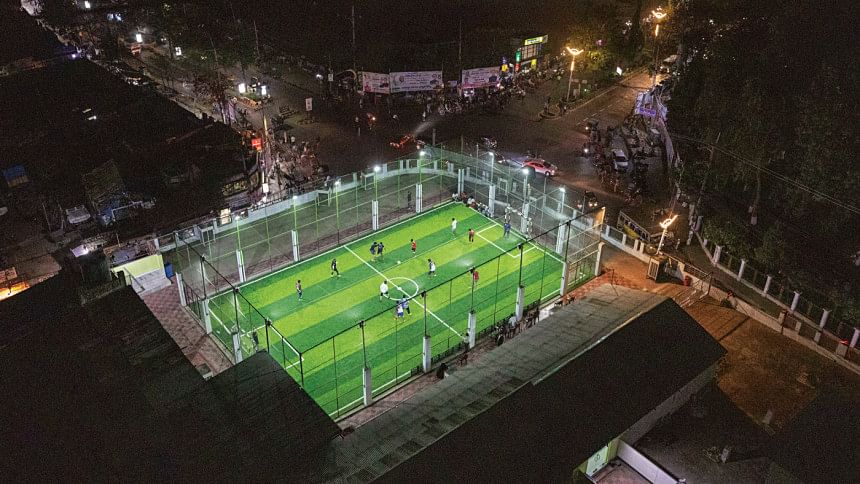
In the memories of those who grew up before the turn of the millennium, the playground was a second home. Schoolyards echoed with the shouts of children chasing footballs, cricket balls flew through the air, and makeshift badminton nets stretched between trees.
Evenings ended only when the sun dipped below the horizon, often followed by a scolding from parents for returning home late, grass-stained and breathless.
But today, the fields are silent.
The children of the 21st century are scolded for the opposite reason – for staying indoors, eyes glued to screens, fingers swiping across smartphones.
Yet, the blame does not lie solely with them. The playgrounds of their parents' youth have vanished, swallowed by concrete, shopping malls, and apartment blocks.
The few remaining open spaces are either locked away or too crowded to accommodate a proper game.
Dhaka and even Chattogram – cities once dotted with open fields – now suffocate under the weight of urbanisation. The guardians of today's youth lament the lack of space, the absence of a place where their children can run freely.
The problem is not laziness; it is scarcity.
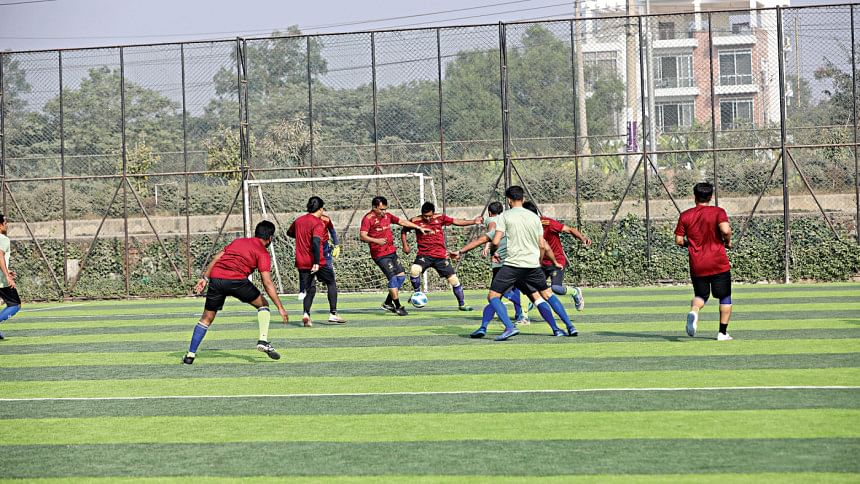
THE RISE OF FUTSAL: A BUSINESS BORN FROM NECESSITY
But where there is a void, entrepreneurs see opportunity.
In the 2000s, a new trend emerged in Bangladesh's urban centres – futsal, a scaled-down, faster version of football, played on smaller, artificial turfs.
Unlike traditional football, which requires vast open fields, futsal could be squeezed into rooftops, vacant lots, and repurposed buildings.
Rezaul Islam, a corporate employee in his early 30s, remembers playing football every evening in his village in Cumilla. It was a common practice to play either football or cricket every day. Even when he got admission to Jahangirnagar University, he used to play every day.
But when he moved to Dhaka for work, his playing days seemed to be over. But he soon came to know of the turf fields and latched on, chasing memories of his childhood.
"Playing gives me fresh recreation, which I cannot get in any other way. As there is no open space or public playground, I managed some of my colleagues who also love to play futsal in the private playgrounds."
"We play in the evening as it is very tough to play under a sunny hot period in a day," he added.
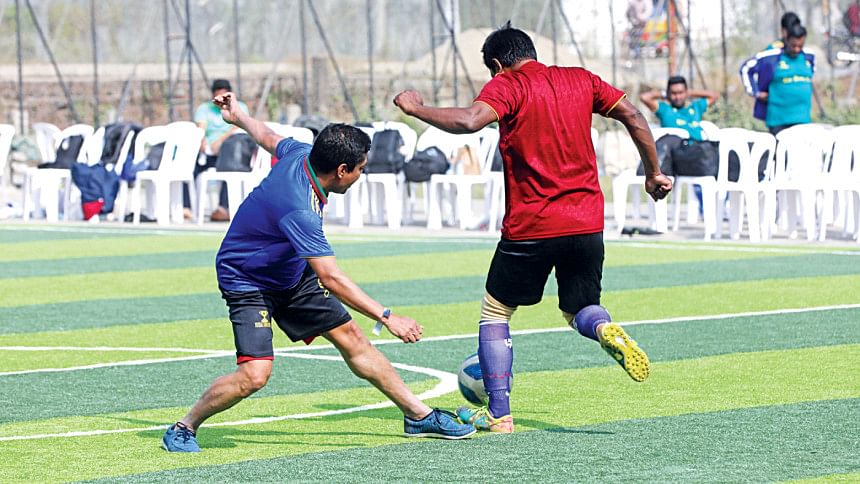
THE ECONOMICS OF ARTIFICIAL GRASS
The business model is simple: find underutilised space, lay down artificial turf, install floodlights, and charge based on time.
Operators charge 90-minute rates, typically ranging between Tk 1,500 and Tk 10,000 per session, depending on the location, amenities and booking time.
The rate is high during peak hours, from 5 PM to 10 PM, while it is lower in the daylight hours, considered off-peak.
As demand soars in the evening, the rate is higher in this period. On the other hand, this period includes electricity bills too.
Md Sazzadul Alam, owner of Eco Sports, said there is almost no public playground in Chattogram, although the number of people is rising. So, he realised that there was a demand for playgrounds. His venture, located in Chattogram's Halishahar area, opened in May 2024.
Almost 80 percent of his clients are those working for corporates, who do their job in the day and seek a ground for recreation at night.
"Previously, our ground was booked for three to four games a day and seven to eight on Fridays. Now, six to seven groups play every day on the ground. Now, it has two grounds. Sometimes, educational institutions also book the grounds for their students," Alam said.
The initial investment depends on the land's situation, advance money, overall structure, and turf quality. Based on turf quality, the costs differ.
If the land situation is such that it does not much work, then a turf may cost around Tk 50 lakh. Every two to three years, the turf needs to be changed, so it needs reinvestment.
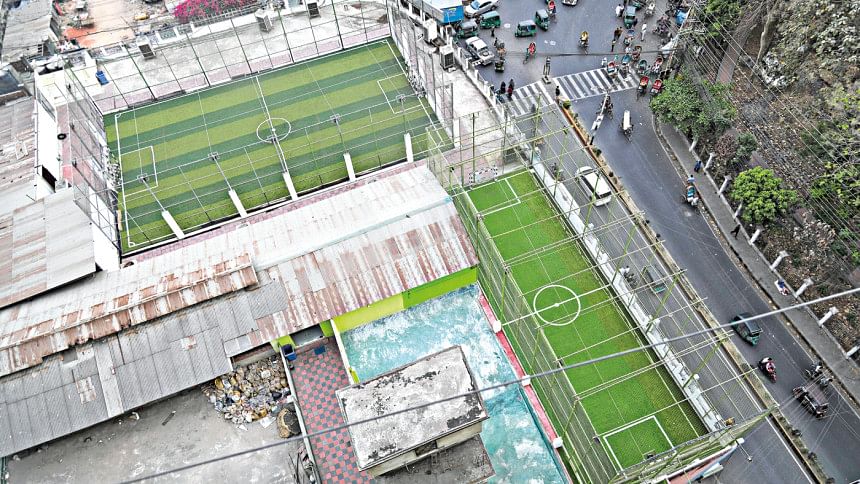
In Chattogram, most such facilities have two fields, meaning the investment amounts to around Tk 35 crore.
Alam said his project was built on low land, so he had to pay around Tk 15 lakh in advance to the owner of the land. After that, he had to spend around Tk 1.2 crore to prepare two fields along with washrooms and a restaurant.
In Dhaka alone, there are over 20 commercial turfs.
The Bashundhara area is home to futsal courts like Offside, JAFF, and The Stadium, which buzz with activity from 5 pm to midnight.
Most have seating arrangements for visitors. So, friends and family can enjoy the games, making it an ideal choice for a memorable outing.
A NEW SPORTING CULTURE
Futsal is more than just a business – it's now reshaping urban sports culture.
Leagues and tournaments are sprouting across Dhaka and Chattogram, giving amateur players a taste of competition. Some facilities even provide referees, locker rooms, and spectator seating, turning a casual game into an event.
For many, it's a social escape. "You meet people from all walks of life here," says Rifat Ahmed, a regular at a Tejgaon futsal court. "Bankers, students, even small business owners – everyone just wants to play."
The passion for football in Bangladesh has always been undeniable. When Argentina's football federation thanked Bangladeshi fans for their World Cup support last year, it was a reminder of how deeply the sport runs in the country's veins.
Futsal, in many ways, is the urban answer to that love – a compromise between space constraints and the undying need to play.
Abdur Rahman Maruf, owner of Sky Turf located on Rafikul Islam Road in Gobindapur, Sanir Akhra, Dhaka, said they observed a rising demand for futsal in various parts of the capital over the past two years. In response, they decided to set up turf around May–June 2024.
"Since launching our turf, we have received a very good response," he said.
Most of the people who come to play at their facility are between 15 and 28 years old, including working professionals. Some senior citizens also participate, he added.
So far, they have invested around Tk 50 lakh in the venture.
"This is a growing sector, and people from various professions are becoming increasingly interested in playing sports. That's why we decided to invest," he said.
In Dhaka, setting up a futsal facility typically costs between Tk 30 lakh and Tk 1 crore, he added.
He also estimated that a total of Tk 150 crore to Tk 200 crore has been invested in the futsal industry across Bangladesh.
According to him, the industry began to gain momentum around 2023.
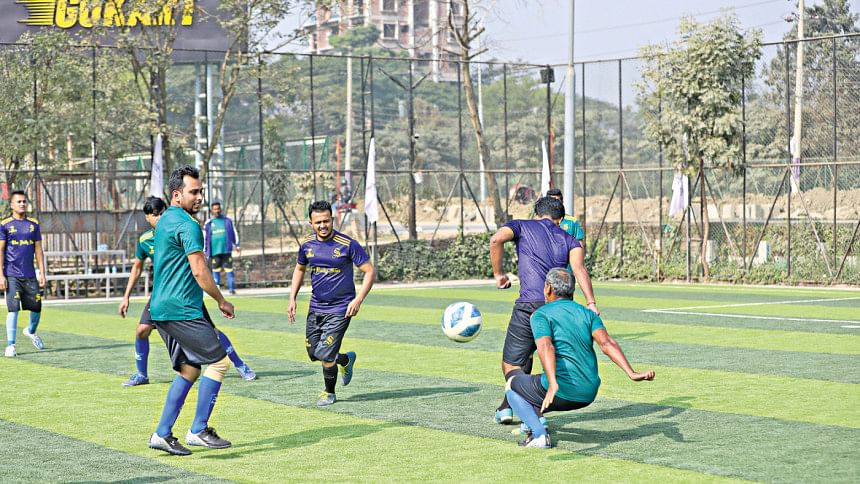
THE TALE OF TURF NATION
On a humid June morning in 2024, construction crews broke ground on what would become one of Dhaka's most vibrant sports hubs. As the founder watched the first turf being laid, he recalled childhood days playing cricket in cramped alleyways – the spark that ignited his vision for Turf Nation.
"I am a sports enthusiast myself, and I have been a fan of cricket for as long as I can remember since childhood. I also had an entrepreneurial mindset early on. So, when I saw a market opportunity and realised that people could use some quality time after their usual campus hours or workday, the idea of establishing a sports complex came to mind. My partners have been immensely helpful in making this entrepreneurial dream a reality as well," Md Nayab Mahmood, the owner, says.
Costing around Tk 3.5 crore, the 21,000-square-foot complex rose steadily in Tejgaon's heart, its two football turfs and cricket pitch taking shape behind MH Samorita Hospital.
Soon, the parking lot overflowed with cars as professionals rushed from work and middle-aged businessmen dusted off their cleats. The founder smiled watching strangers become teammates over shared victories and defeats.
His usuals are mostly corporate employees, students and young professionals. "But we are seeing a surge of individual entrepreneurs, business people and older professionals come along and maintain an active lifestyle through sports activities here with their friends and community members."
He also shed light on other similar venues, saying: "In Dhaka, aside from futsal courts, there are several privately owned sports grounds offering facilities for football, cricket, and other sports. However, the number of these private grounds is relatively low compared to the demand. In the urban landscape of Dhaka, where land is limited, the availability of privately owned sports grounds is scarce, making futsal a popular and practical option for sports enthusiasts."
THE COST OF PLAYING
Yet, the industry faces hurdles.
Despite its rising popularity, high rental costs for land, limited government support, and maintenance expenses for artificial turfs pose challenges.
Additionally, accessibility remains a concern, as most futsal fields are concentrated in affluent areas, making it difficult for underprivileged communities to participate.
Moreover, land is expensive, and rental costs eat into profits. Maintenance is relentless – rain damages the turf, and electricity bills for night games add up.
Management is also a big thing if any dispute happens among players. So, management needs to be strong, and there should be CCTVs, Alam said.
Despite the obstacles, the trend shows no signs of slowing. Online platforms like Khelbokoi and Turf Booking allow users to reserve slots weeks in advance. Some even help form teams for those short on players.
As the sun sets over Dhaka, the floodlights of rooftop turfs flicker to life. The sound of sneakers scraping against artificial grass, the shouts of players, the occasional cheer – it's not the same as the open fields of the past, but it's something.
And through each of these vibrant green courts, those who once went to sleep only to wake up to a grim reality may have just started dreaming again.


 For all latest news, follow The Daily Star's Google News channel.
For all latest news, follow The Daily Star's Google News channel. 



Comments